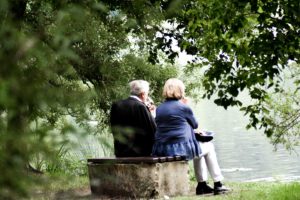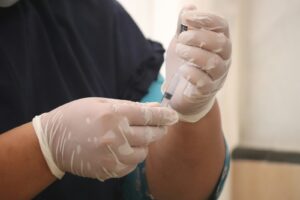Care home residents will be able to stay overnight
Care home residents will be able to spend more time with family and friends, including overnight stays as part of an easing of visiting restrictions.
Currently, residents can only leave the care home for a visit if outdoors or for high-priority reasons, such as a dental or GP appointment, but will now be able to leave the home for more social reasons without having to isolate.
From June 21, people admitted to a care home from the community will no longer have to self-isolate for 14 days on arrival, so residents will have a less disruptive introduction to their new home.
To ensure this happens safely, residents will undergo an enhanced testing regime – a PCR test before admission, a PCR test on the day of admission and a further PCR test seven days later.
Minister for care, Helen Whately said: ‘I have heard first-hand from those living and working in care homes how difficult the restrictions around visiting have been and I’m incredibly grateful to everyone working in the sector who has helped reunite families safely.
‘Thanks to the continued success of the vaccine rollout, I am pleased we can now take another step towards normality, helping more people enjoy visits out of the care home while protecting them from the continued risk of Covid-19.’
The government has also strengthened the role of the ‘Essential Care Giver’, which means every resident should be able to nominate a friend or family member to provide extra care on their visits. Essential Care Givers can continue to visit during outbreaks.
The Essential Care Giver role is intended to provide additional support from someone with a unique personal relationship with the resident.
They have access to the same PPE and testing supply as care home workers and should be allowed to continue to visit during periods of isolation or where there is an outbreak.
Care home residents would still need to isolate for 14 days following a visit out that would be deemed high risk through a risk assessment or after an overnight stay at the hospital.
If a person is admitted from a hospital or another care home they must also self-isolate.

The National Care Forum (NCF) has welcomed the new guidance. Vic Rayner, CEO of the NCF said:
‘The clear statement by government outlining that each and every care home resident should have access to an essential caregiver is an important step in ensuring that all residents are supported by those who are most important to them through any further restrictions or outbreaks.
‘The vital connection between residents and their loved ones has been broken for too long for many people, and this guidance will bring a sense of normality one step closer for those most impacted by this pandemic.
‘In addition, the press release appears to outline a vital next step in terms of ensuring people can be admitted to care homes from their own home and we anticipate access the respite care that they need, without having to go through 14 days of isolation. This will have a huge impact on people who need care and their families.
‘The pressure on carers and those needing care cannot be overstated. In recent months as people have begun to have freedoms returned, we were hearing more and more about people unable to take important decisions about when and how to access care because of the incredibly negative impact of isolation.
‘Finally, we welcome the understanding that people in care homes are part of communities, and need to be able to take part in their wider family life by staying away overnight with family and friends and not having to isolate on return.
‘These are all positive steps towards the full levels of freedom we hope that everyone in care homes will now be able to achieve in line with the wider population on the 19th July.
‘However, as ever, the implementation of this new guidance does not come without a cost. The government must take action immediately to support these changes and ensure that everyone can benefit from the updates outlined.
‘It must not be forgotten that on June 30 all additional funding allocated to cover costs associated with Infection Prevention and Control, the management and support of visiting and enhanced testing comes to an end.
‘Care providers desperately need future funding confirmed to ensure they can continue to pay staff to isolate effectively, to increase their capacity to facilitate and administer enhanced testing for those admitted to care homes, or visiting out of care homes, and enhanced visiting capacity and testing for greater numbers of essential caregivers.
‘Hundreds of thousands of residents and their relatives require this key issue to be addressed urgently. As ever the detail is required, and at present, we are still waiting to see the full guidance underpinning these arrangements.’
Photo Credit – Sven Mieke















